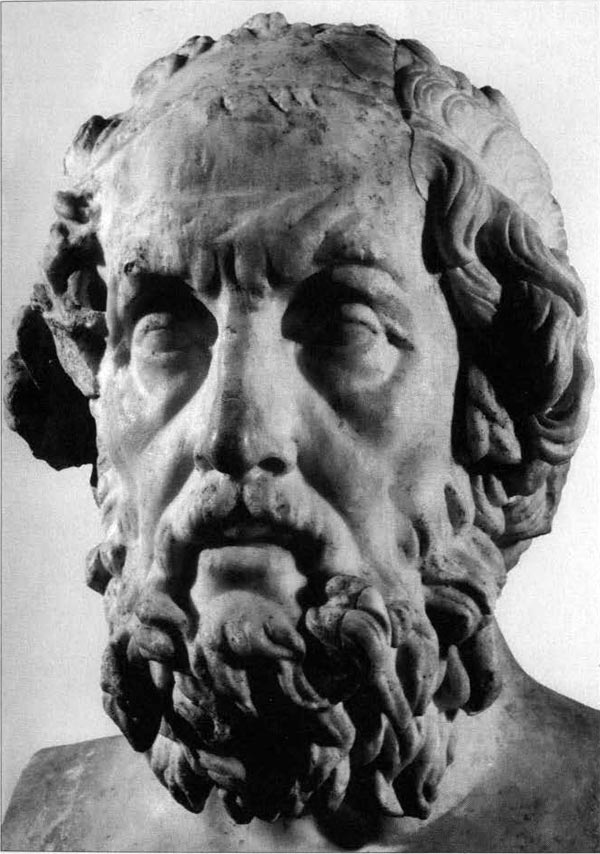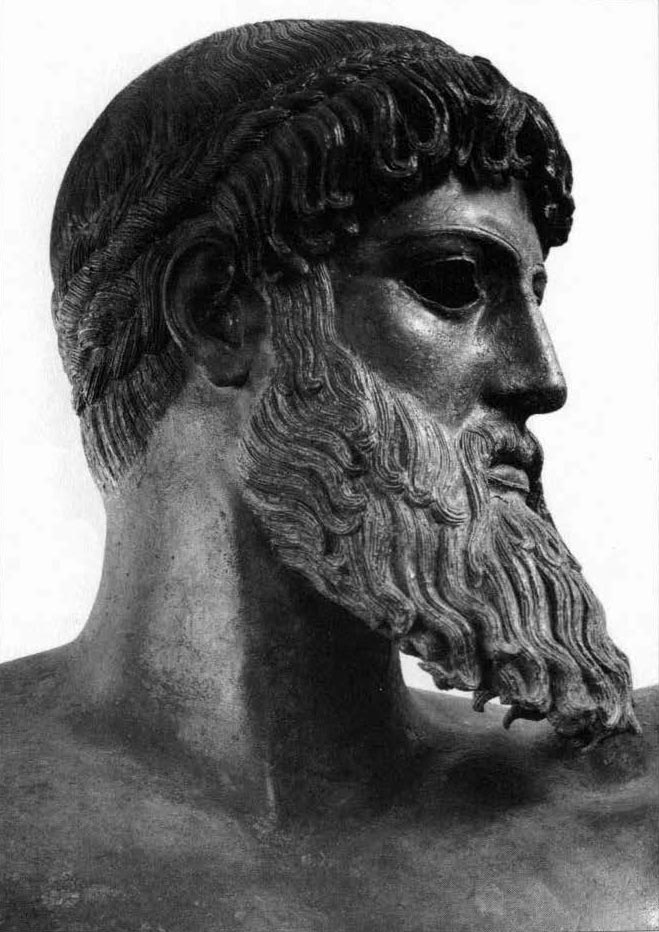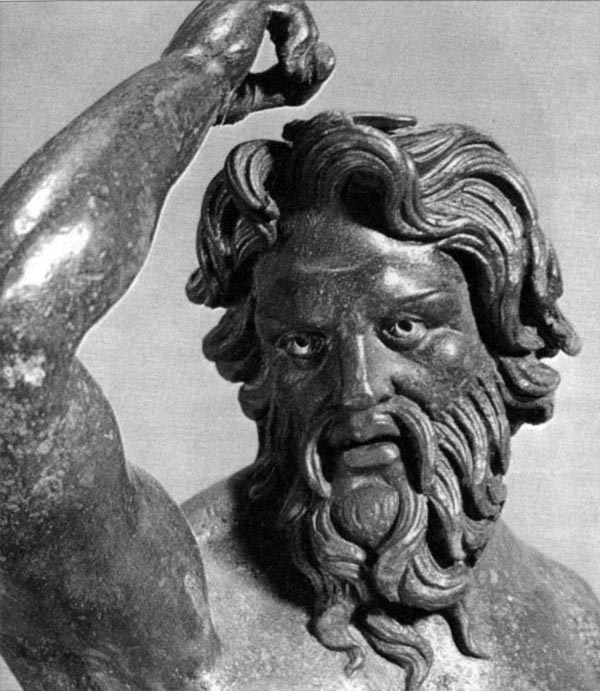Gods and The World - The Iliad

A bust of the epic poet Homer (2nd century BC)
The Iliad
Introduction
The earliest examples of Greek literature are two epic poems, the Iliad and the Odyssey, which most scholars today agree to attribute to one single great poet, Homer.
Both epics were written down sometime in the 8th century BC. During this period the Greeks, after a long dark age following the collapse of the Mycenaean culture in the 12th century BC, had once again developed a civilisation complex enough to need writing and had learned alphabetic script from the Phoenicians.¹ Despite the acquisition of writing these Greeks lagged far behind the Mycenaeans. Politically they were less organised, and technologically they were more primitive for example chariots no longer existed in Greece at the time of Homer. However, they possessed an elaborate oral tradition.
According to tradition, the goddess of memory as well as of poetry inspired the poet to tell his tales, and successive generations of trained poets learned and taught a wealth of literary material orally. In keeping with the oral tradition. Homer created the Iliad and the Odyssey by taking building blocks of material from the poets who preceded him and .reshaping them to form the foundations of his artistic creation. These blocks included various myths about the gods and about heroes of old (the fathers of the heroes of the Trojan War), myths about the war with Troy and its various participants, from long before the start of the war until
the last of the heroes had returned home. He furthermore, set passages describing scenes of sacrifice, fighting and funerals and particular descriptive phrases, called epithets, that describe gods, people and nature as examples among many, 'Zeus is Lord of lightning, the Thunderer, Lord of the gathering gale; Poseidon, the great shaker of shores, creator of earthquake. Lord of the main;*Hermes is, luck bringing, and Aphrodite, adorer of smiles. In the same vein, he writes of swift-footed Achilles and noble, long-suffering Odysseus.
It is assumed that Homer came from Asia Minor and was probably born on the island of Chios, or possibly in the city of Smyrna. A guild of poets did exist on Chios and in his hymn to Apollo, Homer sings of: "A sightless man on stony Chios /All whose poems stand capital." From these lines and the fact that both the bards in the Iliad and the Odyssey are blind, it has been suggested that Homer was most probably blind himself.
By the 6th century BC, the Greeks attributed both the Iliad and the Odyssey to Homer, and it is possible that the authoritative edition of the Odyssey existed in Athens at that time. Numerous papyrus fragments of both epics exist dating from the 4th century BC. However, the oldest complete manuscripts of the Iliad and the Odyssey we have today date from the 10th century AD.
Homer may have been the first historian of ancient Greece. Archaeologists assume that a war against Troy actually occurred, although the remains they have found of that particular Troy are trifling compared to Homer's description of Priam’s great city.
The city did burn in 1184 BC which is the accepted date of its destruction. Soon after, due to the Dorian² conquest, Greece fell into a long dark age out of which, many centuries later, emerged one of the most creative nations of the Ancient world.
Why are the poems of Homer so universal in significance and perennial** in appeal? First he tells a good story and tells it well. The Homeric hero becomes so real to us that we can easily
* main: high sea.
** Perennial: persistent, enduring.
identify with him, gaining insights into our own feelings and goals. Human behavior and the emotions that cause it obviously fascinated Homer; never will he tell us what his characters are like, instead he reveals their personalities by actively involving us in their moments of crisis. Therefore the opening lines of the Iliad state that his focus will be the anger of Achilles and the devastation it caused all the Greeks who were fighting against Troy. In keeping with this perspective. Homer’s style is dramatic rather than narrative. As a poet and as a singer what he sings is "tragic joy” or, as Rachel Bespaloff says "what he exalts and sanctifies is not the triumph of victorious force but Man's energy in misfortune, the dead warrior's beauty, the glory of the sacrificed hero...”
When the Iliad opens the Achaeans have been sieging the city of Troy for more than nine years. The declared motive of the war had been the abduction of Helen, beautiful wife of Menelaus, king of Sparta, by Paris, prince of Troy. To avenge this deception the whole of the Achaean forces, under the commandership of Agamemnon, Menelaus' brother and king of Mycenae, had left for Troy. We are told in one of Aeschilus's play "Agamemnon” of the tragic story of Agamemnon's daughter, Iphigenia, who was to be sacrificed at Aulis, a place of strong winds and dangerous tides, where the Greek fleet met. Only her death, it was said could ensure a safe crossing.
For nine years victory had wavered, now to this side now to that. Then a quarrel flared between Agamemnon and Achilles, son of Peleus and the sea-goddess Thetis, and for a time it turned the tide in favor of the Trojans. Again, the reason was a woman.
Agamemnon had received Chryseis, daughter of Apollo’s priest, as a price of honor, and when her father came, offering him great treasures for her release, he had refused. The priest then prayed to Phoebus Apollo, the mighty 'god he served, and Phoebus Apollo heard him. From his sun-chariot he sent fiery arrows and men and animals perished of a pestilence, in great numbers.
Achilles then conveyed an assembly of the Greek chieftains in which the prophet Calchas revealed that the release of Chryseis
was the only way to appease the angry god. Agamemnon had to agree but he was greatly angered and vowed that if he had to give back his price of honor he would have another in her stead. Therefore when Chryseis was returned to her father, he sent his squires to Achilles’ tent to take away from him the captive Briseis, Achilles’ own price of honor. Deeply humiliated Achilles retaliated by withdrawing from battle and this decision resulted in needless suffering and death among the Greeks.
The war by now had reached Olympus. The gods were ranged against each other. Aphrodite was on the side of Paris, Hera and Athena against him. Ares, god of war, always took side with Aphrodite, while Poseidon, Lord of the sea, favored the Greeks, a sea people and great sailors. Apollo helped the Trojans for the sake of Hector, son of Priam and mainstay of Troy, and Artemis, his sister, did so too. Zeus, for his part, tried to stay neutral, but, urged by Thetis, who cruelly wounded by her son’s dishonor wanted a Trojan victory, agreed to help and sent a false dream to Agamemnon promising him victory. Instead, at the end of the day, and after dreadful fighting, the Trojans had driven the Greeks almost back to their ships,
There was great rejoicing in Troy that night, but grief and despair in the Greek camp and Agamemnon himself was all for giving up and sailing back to Greece. His advisers though counseled him to apologize to Achilles, and Agamemnon finally accepted to send him back Briseis and many other splendid gifts if only he would rejoin the Greek ranks and keep Hector from burning their ships but Achilles still refused his help.
Not until his beloved friend Patroclus finds his death at the hands of Hector will Achilles return to the battlefield. He will finally kill Hector, and the Iliad ends up abruptly with Hector’s funerals.
From other sources, we learn that this doesn't mark the end of the Trojan War. Achilles himself will be killed by Paris who, favored by Apollo, aims a fatal arrow at his only weak point, his heel, and Paris in turn will meet his death at the hands of an other Greek warrior, Philoctates.
As legend goes, mighty Troy will never be taken by force but fall victim of a stratagem played on her by the Greeks.
"Crafty Odysseus” convinced the dispirited army to build up a huge wooden horse, deceitfully dedicated to Athena, in which hollow stomach warriors could be hidden, and to leave it on the beach. Then the Achaean fleet took to the sea and hid out of Troy’s view. The Trojans, persuaded that the Greeks had sailed away, and fearing Athena’s anger, took the horse within their walls. At night, when everybody was asleep, Odysseus and other soldiers came out and opened the gates to the rest of the army.
When morning came, what had been the proudest city in Asia was fiery ruin.
As the invocation of the Iliad says, "the will of Zeus was done”. .
The excerpt presented here is taken out of book 20, " The Gods at War.” Earlier in the story, the gods, on Zeus' demand, had withdrawn from the battlefield. They are now conveyed to come to an assembly on mount Olympus and asked to help once more, now that Achilles has joined the conflict.
I have indeed called this gathering of the immortals
Because of my deep concern for those warriors, doomed
Though they are. I myself, of course, will stay on a ridge
Of Olympus, from which I may watch the war as I please.
But all of you other immortals go down and help
The Achaeans and Trojans, aiding which ever side you prefer.
........
Thus the happy gods greatly augmented the clash
Of battle and made strife break out everywhere
Between the two armies fighting in horrible uproar.

Notes
1. Phoenicians: The Phoenicians were the greatest traders of the ancient world, and they dominated Mediterranean trade from 1200 BC to 300 BC. Originally living on the fertile coasts of the eastern Mediterranean, in what is now Syria and Lebanon, they developed important trading centres in various parts of the Mediterranean, the most important being Carthage in North Africa.
In the Aeneid, the Latin poet Virgil tells how Aeneas, guided by his mother, the great goddess Aphrodite, leaves Troy in flames, with his family and other Trojan refugees, and after many adventures, finds refuge in Carthage where he meets Dido, the great queen who founded it.
Virgil (70 BC-19 BC) who has for centuries been acknowledged as the greatest Roman poet, used the Iliad and the Odyssey as the basis for his great epic, the Aeneid, in which he glorifies Rome. Aeneas has been always considered the heroic ancestor whose descendants would one day found this beautiful city.
2. The Dorians: coming down from the North through Illyria and Thessaly, the Dorians invaded the Peloponnesus about the year 1104 BC. They almost completely destroyed the Mycenaean culture. Still in the herding and hunting stage, they had one thing in quantity though: iron. The hard metal of their swords gave them a merciless supremacy over Acheans and Cretans (inhabitants of the island of Crete) who still used weapons made of bronze. The result of their conquest was a long and bitter interruption in the development of Greece.


Zeus

Poseidon, the brother of Zeus and the Lord of the seas, was also the Master of the Horses.
Related Books
- Alexander the Great
- Arguments for The Existence of God
- But it is done
- Catherine The Great
- Danton
- Episodes from Raghuvamsham of Kalidasa
- Gods and The World
- Homer and The Iliad - Sri Aurobindo and Ilion
- Indian Institute of Teacher Education
- Joan of Arc
- Lenin
- Leonardo Da Vinci
- Lincoln Idealist and Pragmatist
- Marie Sklodowska Curie
- Mystery and Excellence on The Human Body
- Nachiketas
- Nala and Damayanti
- Napoleon
- Parvati's Tapasya
- Science and Spirituality
- Socrates
- Sri Krishna in Brindavan
- Sri Rama
- Svapnavasavadattam
- Taittiriya Upanishad
- The Aim of Life
- The Crucifixion
- The Good Teacher and The Good Pupil
- The Power of Love
- The Siege of Troy
- Uniting Men - Jean Monnet